What Is Constipation in Cats?
Cat constipation occurs when there is an abnormal and excessive accumulation of feces in the cat’s colon. When this occurs, the cat will have difficulty making bowel movements, resulting in the reduced frequency or complete absence of defecation.
When functioning normally, a cat’s colon absorbs water. However, when feces are retained in the colon, it can start to become dry and hard. This causes defecation to become even more of a challenge for the cat. In order to pass feces, the cat will strain. This can lead to abdominal pain.
In some cases, a cat may pass liquid feces or even blood. This is a result of straining too hard. This liquid feces may look like diarrhea. However, it occurs when a cat strains and small amounts of liquid squeeze around the solid obstructing fecal mass.
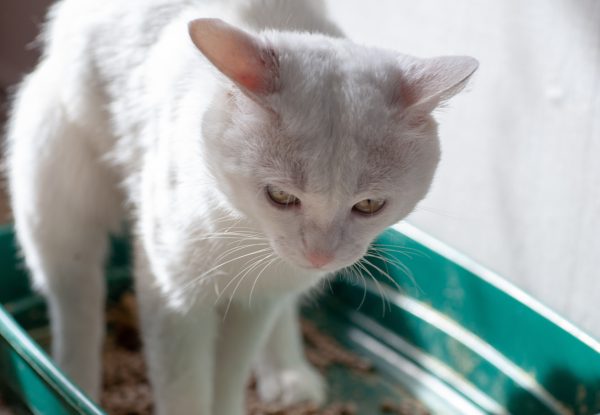
Causes of Constipation in Cats
Constipation most often occurs in middle-aged and older cats. However, it can affect cats of any age. Common causes include:
- Ingestion of a foreign body (such as a fragment of bone)
- Hairballs (particularly in longhaired breeds such as Himalayans and Ragdolls
- Obesity
- Lack of exercise
- Hernias
- Nerve disorders
- Lack of fiber in the diet
- Certain medications
- Stress or anxiety
- Injuries to the pelvis that result in a narrowing of the pelvic canal
- Tumors
- Kidney problems
For some cats, litter box avoidance can be a problem that leads to constipation. Litter box avoidance may also be triggered by urinary tract problems, such as urinary tract infections.) A cat may avoid the litter box due to the following reasons.
- The litter box is dirty.
- Another cat also uses the litter box.
- It doesn’t like the litter used.
- The cat has had previous negative experiences while using the litter box.
In many cases, there is no clearly identifiable reason for . Constipation may be a symptom of idiopathic megacolon.
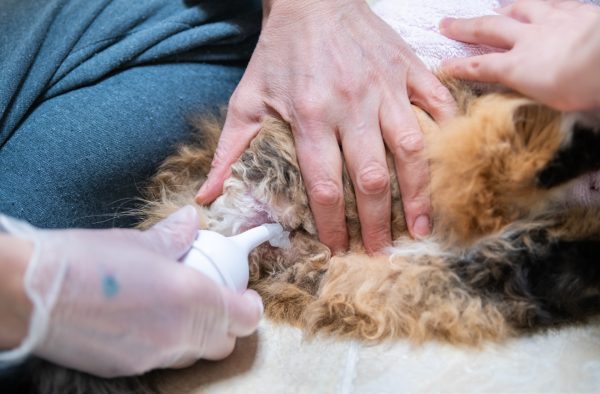
What Is Megacolon?
If a cat has megacolon, its colon muscles will weaken. As a result, the fecal matter will get lodged in the colon. The causes of megacolon could either relate to the muscles that line the colon or a neurological impairment. In some cases, it could be caused by both.
When a cat’s colon retains fecal matter and is distended for a long period, it may lose the ability to contract. Megacolon can be seen as being both a primary and secondary condition relating to constipation.
Cat Constipation Symptoms
If a cat fails to produce stools for more than a day, it may be constipated. Many owners do not know how to tell if a cat is constipated as it can be hard to monitor a cat’s bathroom habits. Also, some felines choose to bury their feces outdoors.
Spotting infrequency in defecation may not be immediately obvious, so owners should look out for the following cat constipation signs:
- Small, dry, and hard stools
- Straining
- Poor appetite
- A change in posture
- Tension in the abdomen
- Vomiting
- Lethargy
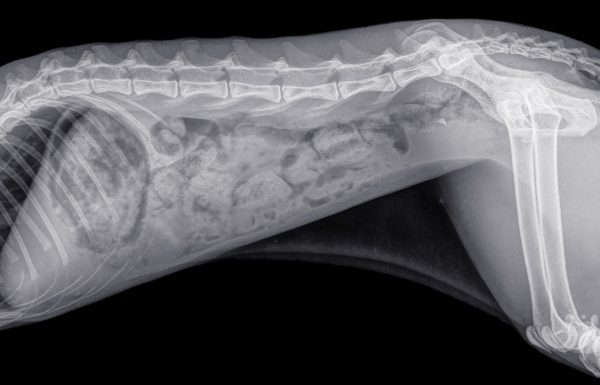
Diagnosing Cat Constipation
Diagnosing constipation can usually be done by identifying the clinical signs and reviewing the cat’s medical history. When a cat is unable to produce stools, it may cry in pain.
A veterinarian will often be able to feel the built-up fecal matter situated in the colon unless the cat is obese. To identify the exact cause, pelvic X-rays may be carried out. These will look for an injury to the pelvis, any strictures or narrowing of the colon, and tumors.
In addition, blood and urine tests will be used to identify any underlying conditions that may be contributing to the constipation.
Constipation in Cats Treatment
The treatment recommended by the veterinarian will vary depending on the cause of constipation.
Initially, constipation in cats’ treatment may consist of enemas and the manual extraction of feces. This will usually require a sedative or anesthetic. In addition, the cat may need intravenous fluid therapy to overcome dehydration caused by constipation.
If constipation is recurring, a change of diet may be necessary, along with preventative medication. In cats that have mild recurring constipation, switching to a high fiber diet may be helpful, as will the use of stool softeners and lubricating laxatives.
Cats that are more severely affected may need drugs that are designed to stimulate the contraction of the colon. When the cause is an obstruction (such as a colonic tumor), surgery may be needed.
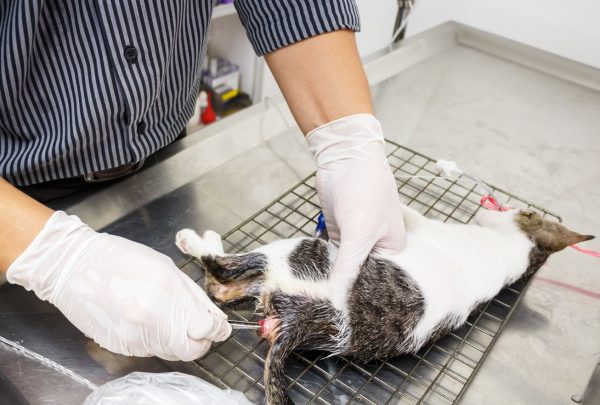
Cat Constipation Remedies
Many owners will want to know whether there are any home remedies for cat constipation, as well as how to help a constipated cat.
Here are some suggestions of what to give a constipated cat:
- Minimize anxiety and stress within the home
- Promote exercise to aid weight loss, encourage the normal movement of the intestines, and reduce anxiety
- Switch to a fiber-rich diet (for cat constipation, pumpkin puree in small amounts is helpful)
- Use probiotics
- Use over-the-counter laxatives
- Clean the litter box frequently and consider buying a second one
Hydration should be increased while a cat is constipated. Owners should provide adequate fresh water in several places throughout the home. Bowls should be large enough that the cat’s whiskers do not touch the sides.
Many cats prefer to drink running water. Leaving a tap dripping or providing a drinking fountain are both good solutions for encouraging cats to drink. All water fountains and bowls should be cleaned regularly to ensure the water is safe to drink.
These remedies should be carried out alongside any recommended course of treatment. Before administering any form of home treatment, consult a veterinarian to rule out any chronic or underlying conditions.
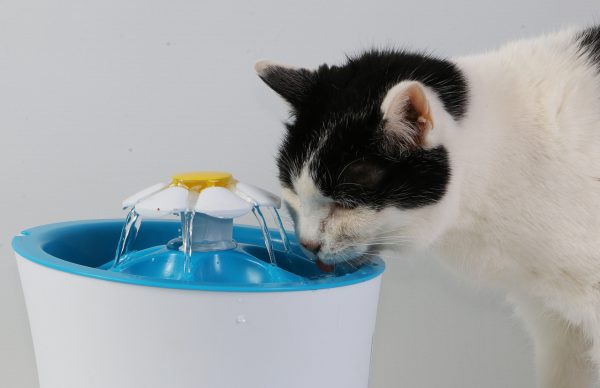
What Should Healthy Cat Feces Look Like?
Generally, cats will defecate at least once daily. If the cat is healthy, the feces will:
- Be dark brown
- Not be too hard or too soft
- Not smell foul
Constipation in Kittens
A neonatal kitten will be unable to defecate or urinate on its own and its mother will assist. When rescuing orphaned kittens, it is important that they are stimulated following every feeding session to prevent constipation and urinary issues.
To do this, hold the kitten upside down and use a soft tissue or a baby wipe to gently rub the cat’s genitals and anus to stimulate urination and bowel movement. This may take a few minutes and should be done until the kitten has finished urinating and defecating.



